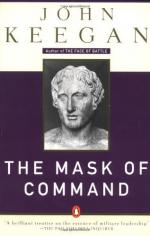
|
| Name: _________________________ | Period: ___________________ |
This quiz consists of 5 multiple choice and 5 short answer questions through Part 4, Chapters 1-7.
Multiple Choice Questions
1. In ____________, Wellington was awarded with the Order of the Garter as well as a field marshal's baton.
(a) 1803.
(b) 1813.
(c) 1818.
(d) 1823.
2. Hitler's final words echoed the same things he had said at the onset of WWII in 1939, that he would ask no more of the German man than he would _________________.
(a) Give of himself.
(b) Give of the German man.
(c) Ask of his family.
(d) Ask of others.
3. The first piece of news about Napoleon's attack on the Prussians reached Wellington while he was preparing to do what?
(a) Plan an attack.
(b) Go to sleep.
(c) Eat dinner.
(d) Attend a ball.
4. Philip had been married _________ times by the time he married OIympias and would marry another three times afterward, casting Olympias and the other wives aside as he tired of them.
(a) Three.
(b) Two.
(c) Four.
(d) Five.
5. Keegan dispels what myth of Hitler's?
(a) He was insane.
(b) He lived in the woods during the war.
(c) He ran away to Belgium during the war.
(d) His grand lodgings during the war.
Short Answer Questions
1. Chapter six, "Hitler in Command", may be the ____________ chapter in the text.
2. Wellington was well known for having _____________ routine, which is credited for much of his success in planning campaigns.
3. Keegan details the progression of war and what is referred to as ______________________, noting the size of the armies of various countries.
4. How did Wellington dress when going into battle?
5. Chapter one, "Alexander the Great and Heroic Leadership," begins with Keegan comparing Alexander to Napoleon, Attila the Hun, Genghis Khan, Prince Charles, Hitler and others. Does the author believe any of these leaders can compare to Alexander the Great?
|
This section contains 317 words (approx. 2 pages at 300 words per page) |

|




